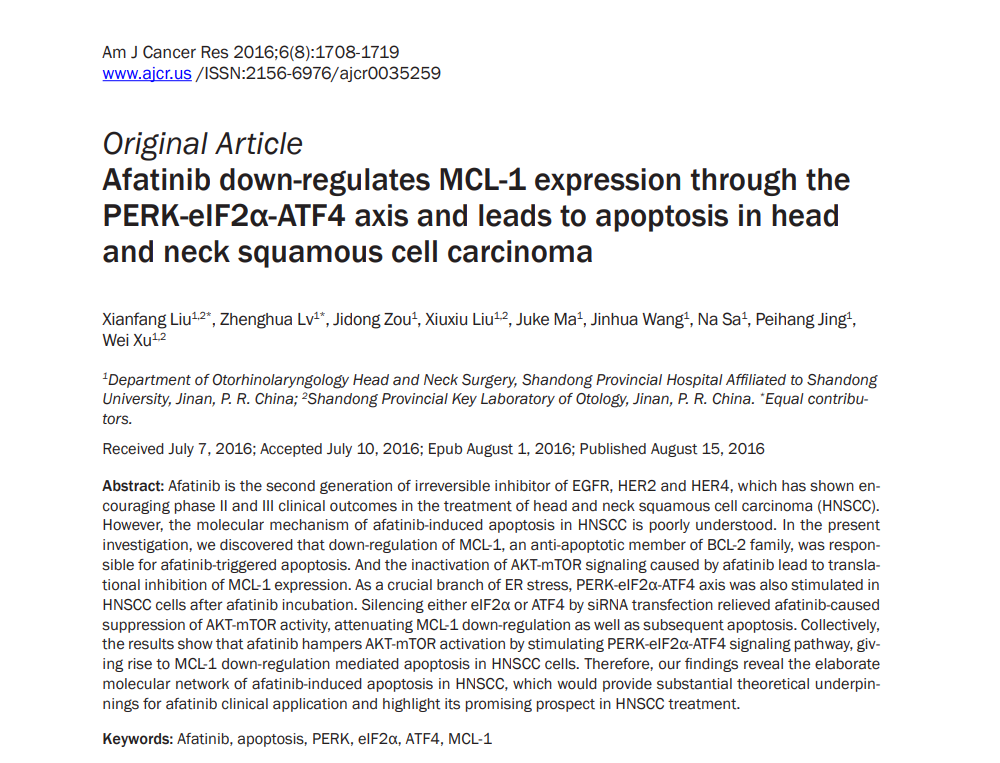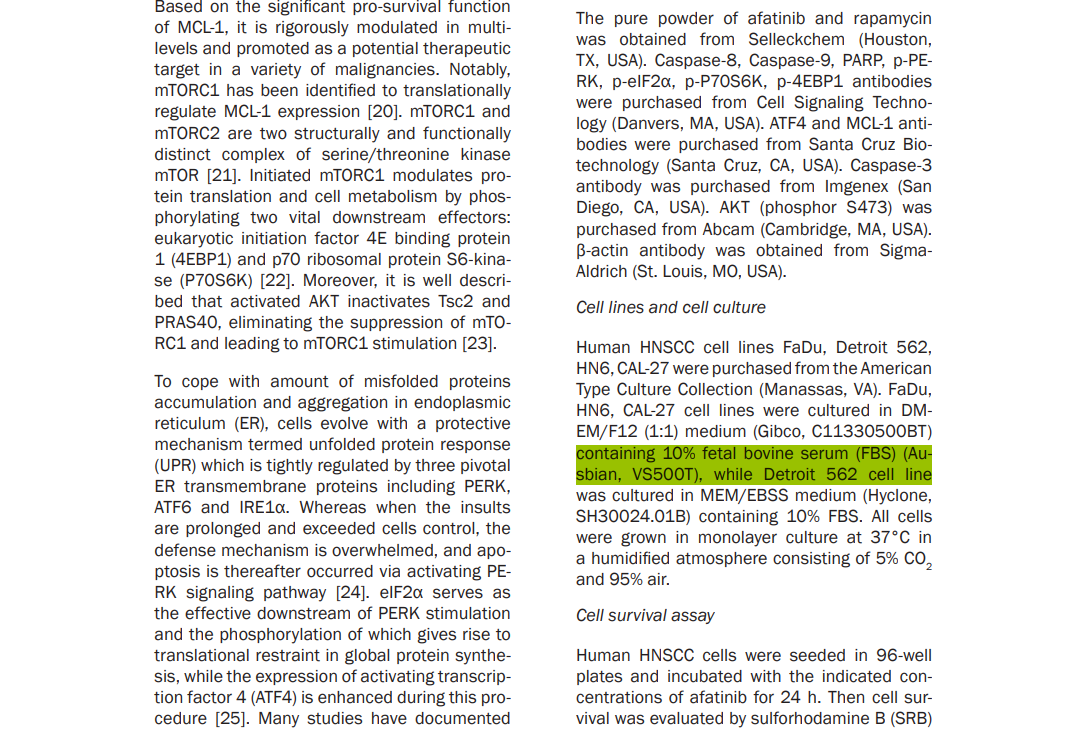阿法替尼通過PERK-eIF2α-ATF4軸下調MCL-1表達,導致頭頸部鱗狀細胞癌細胞凋亡 二維碼
發表時間:2024-09-14 16:18 2016年8月,山東大學附屬山東省醫院耳鼻咽喉頭頸外科,山東省耳科重點實驗室(Department of Otorhinolaryngology Head and Neck Surgery, Shandong Provincial Hospital Affiliated to Shandong University, Jinan, P. R. China;Shandong Provincial Key Laboratory of Otology, Jinan, P. R. China.) Xianfang Liu老師研究團隊在《American Journal of Cancer Research》上發表論文: “Afatinib down-regulates MCL-1 expression through the PERK-eIF2α-ATF4 axis and leads to apoptosis in head and neck squamous cell carcinoma” “阿法替尼通過PERK-eIF2α-ATF4軸下調MCL-1表達,導致頭頸部鱗狀細胞癌細胞凋亡” Abstract: Afatinib is the second generation of irreversible inhibitor of EGFR, HER2 and HER4, which has shown encouraging phase II and III clinical outcomes in the treatment of head and neck squamous cell carcinoma (HNSCC). However, the molecular mechanism of afatinib-induced apoptosis in HNSCC is poorly understood. In the present investigation, we discovered that down-regulation of MCL-1, an anti-apoptotic member of BCL-2 family, was responsible for afatinib-triggered apoptosis. And the inactivation of AKT-mTOR signaling caused by afatinib lead to translational inhibition of MCL-1 expression. As a crucial branch of ER stress, PERK-eIF2α-ATF4 axis was also stimulated in HNSCC cells after afatinib incubation. Silencing either eIF2α or ATF4 by siRNA transfection relieved afatinib-caused suppression of AKT-mTOR activity, attenuating MCL-1 down-regulation as well as subsequent apoptosis. Collectively, the results show that afatinib hampers AKT-mTOR activation by stimulating PERK-eIF2α-ATF4 signaling pathway, giving rise to MCL-1 down-regulation mediated apoptosis in HNSCC cells. Therefore, our findings reveal the elaborate molecular network of afatinib-induced apoptosis in HNSCC, which would provide substantial theoretical underpinnings for afatinib clinical application and highlight its promising prospect in HNSCC treatment. 摘要: Afatinib是第二代不可逆EGFR、HER2和HER4抑制劑,在治療頭頸部鱗狀細胞癌(HNSCC)中顯示出令人鼓舞的II期和III期臨床結果。然而,阿法替尼誘導HNSCC細胞凋亡的分子機制尚不清楚。在本研究中,我們發現BCL-2家族抗凋亡成員MCL-1的下調與阿法替尼引發的細胞凋亡有關。阿法替尼引起的AKT-mTOR信號失活導致MCL-1表達的翻譯抑制。作為內質網應激的重要分支,PERK-eIF2α-ATF4軸在阿法替尼培養后也受到刺激。通過siRNA轉染沉默eIF2α或ATF4可緩解阿法替尼引起的AKT-mTOR活性抑制,減輕MCL-1下調以及隨后的凋亡。綜上所述,阿法替尼通過刺激PERK-eIF2α-ATF4信號通路抑制AKT-mTOR的激活,引起MCL-1下調介導的HNSCC細胞凋亡。因此,我們的研究結果揭示了阿法替尼誘導HNSCC細胞凋亡的精細分子網絡,為阿法替尼的臨床應用提供了堅實的理論基礎,并突出了其在HNSCC治療中的廣闊前景。 該論文中,人HNSCC細胞系FaDu、Detroit 562、HN6、CAL-27的體外培養是使用Ausbian特級胎牛血清完成的。欲了解或購買Ausbian特級胎牛血清可以聯系北京締一生物400-166-8600.
|
|





